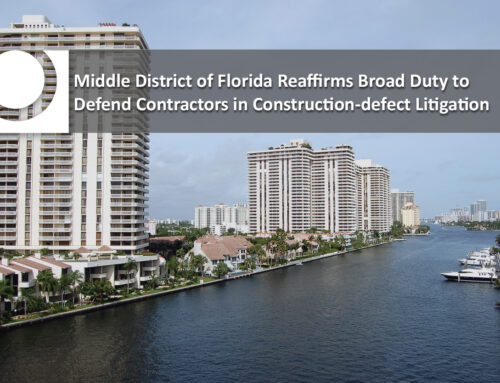Last week, a divided Florida Supreme Court strengthened policyholders’ bad-faith claims against insurers by overturning an appellate court’s decision, finding that the lower court had misapplied Florida’s well-established bad-faith precedent and had relied on inapplicable federal case law.
In Harvey v. GEICO General Insurance Co., James Harvey was involved in an automobile accident that resulted in a fatality. Following the accident, a paralegal with counsel for the deceased’s estate spoke to Fran Kourkas, a GEICO claims adjuster regarding the claim, requesting a statement from Harvey to determine the extent of his assets and other potential insurance coverage. Kourkas denied this request, despite knowledge that it was standard practice, and he failed to inform Harvey of the request.
Shortly thereafter, GEICO tendered the $100,000 policy limits to Sean Domnick, the lawyer representing the decedent’s estate. When Harvey learned of Domnick’s request, he informed Kourkas that he would provide a statement and requested that Kourkas inform Domnick, but Kourkas did not relay the message. Due to Kourkas’s failure to communicate, Domnick returned GEICO’s check and filed a wrongful-death action against Harvey. The case went to trial and Harvey was found 100% at fault. The estate was awarded $8.47 million in damages.
Harvey filed a bad-faith claim against GEICO based on the excess judgment. Domnick testified that he received no communication from GEICO after his request for a statement, and that if he had been aware that Harvey’s only other asset was a business account worth $85,000, he would have accepted the policy limits and would not have filed suit. The decedent’s wife testified that she would have settled for the policy limits at Domnick’s recommendation. At the trial on these bad-faith claims, the jury awarded Harvey $9.2 million. GEICO appealed, arguing that Harvey had failed to provide evidence of bad faith. The appellate court agreed and reversed, stating that “even if the insurer’s conduct was deficient, the insurer’s actions did not cause the excess judgment rendered against the insured.”
Bad-faith standard
The Florida Supreme Court reversed the Court of Appeals. In its opinion, the Florida Supreme Court expressly disavowed the holding in Novoa v. GEICO Indemnity Co., in which the 11th Circuit Court of Appeals found that an insurer did not have to act “perfectly, prudently or even reasonably” as long as the insurer did not act solely out of self-interest.
The Florida Supreme Court also cited a 1980 case, Boston Old Colony v. Gutierrez, for the proposition that an insurer has a duty to handle defense claims with the same degree of care and diligence as a person of ordinary care and prudence would exercise in the management of his own business. The Court noted that because the duty of good faith involves an insurer’s diligence and care, the insurer’s negligence is relevant to a question of bad faith.
The insurer has this duty because it controls all decisions related to the claim, and the insured has no control over the claim handling. The Court further relied on Boston Old Colony, finding that an insurer must provide certain advice to an insured, including the probable outcome of litigation, the possibility of an excess judgment, and steps to take to avoid such a judgment. The court cautioned that these requirements are not a “mere checklist.” Rather, the insurer must work diligently, with the same “haste and precision” as though it were in the insured’s shoes, in order to avoid an excess judgment.
The Court found that where liability is clear, and injuries or damages are so serious that an excess judgment is likely, the insurer has an affirmative duty to initiate settlement negotiations and any delay in making an offer could be viewed as bad faith. Further, an insurer cannot escape its obligations to the insured by simply tendering its policy limits. The insurer’s obligations to the insured continue throughout the duration of the claims-handling process.
The Court concluded that GEICO had failed to act as if Harvey’s potential financial exposure was “a ticking financial time bomb” and served as a “considerable impediment” to both Harvey and Dominick. GEICO failed to act with the same degree of care and diligence as an ordinary, prudent person would in the handling of his own business. Accordingly, it acted in bad faith.
Causation
The Court also disavowed the holding in Barnard v. GEICO General Insurance Co., in which the 11th Circuit Court of Appeals found that if an insured’s own actions or inactions result, at least in part, in an excess judgment, the insurer cannot be found liable for bad faith. The Court found that this statement was “fundamentally inconsistent” with Florida precedent, including Berges v. Infinity Insurance Co., which focuses on the actions of the insurer, not the insured. Florida law is clear that an insured’s actions do not excuse an insurer’s bad-faith handling of a claim.
The Court concluded that GEICO’s continued communication failures were a direct cause of the excess verdict, as Domnick had testified that had he been aware of Harvey’s assets, he would have accepted the policy limits and would not have filed suit. As such, GEICO acted in bad faith.
How does this affect policyholders?
This opinion is a valuable tool against insurers in future bad-faith cases, as it loosens and broadens the bad-faith standard in Florida. The opinion requires that an insurer put an insured’s interests first and work diligent and hastily to avoid excess judgments. The opinion also strengthens the argument that an insurer is under an affirmative obligation to initiate settlement negotiations in cases where excess judgments are likely, and that even negligent claim handling can result in a finding of bad faith.
Conclusion
Harvey is a win for policyholders. It simply and succinctly states Florida’s bad-faith standard and provides guidance to federal courts on the issue. It also underscores the importance of diligent, competent, and expedient handling of claims, while simultaneously preventing the insurer from shifting the blame for an excess judgment to the policyholder.



